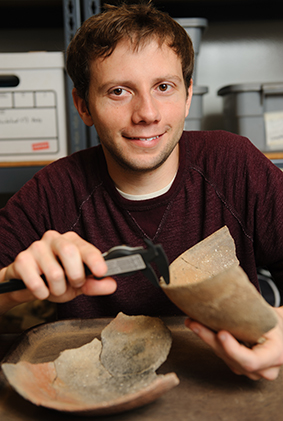
From the May 2014 Desktop News | What impact did the salt trade have on northwestern Louisiana during the 18th century? Paul Eubanks, a doctoral student in the Department of Anthropology, is on a mission to find out.
Eubanks recently received an $18,000 Dissertation Improvement Grant from the National Science Foundation to explore the topic. His project, “Caddo Salt Production in Northwestern Louisiana,” focuses on the role of Caddo Indian salt makers in the development of Louisiana’s history in the post-Columbian world.
“What originally got me interested in the archaeology and history of northwestern Louisiana was salt,” Eubanks said. “Given its limited availability away from coastal areas, participating in the production and trade of salt at inland salt springs would have been a profitable venture for European traders and American Indians alike.”
His interest was sparked, in part, by the small number of documented archaeological investigations conducted on the Louisiana salt trade, despite its importance in helping to forge economic and political ties.
“The Caddo salt makers at this site were capable of producing hundreds of pounds of salt each year, which they then traded to the French, Spanish and to other American Indian groups,” Eubanks said. “Given its role in hide tanning and meat preservation, as well as its dietary use, the high demand for salt would have placed the Caddo salt makers in a unique position of economic power following European contact.”
To address the topic, a team will conduct excavations at the Drake’s Salt Works archaeological site near Goldonna, La., northeast of Natchitoches. To provide a glimpse into the daily lives of the Caddo salt makers, Eubanks will reconstruct the salt making process at the site.
The project also examines changes in the intensity of Caddo salt production following sustained contact with French traders and settlers. The findings from Eubanks’ research, when compared to studies of other societies around the world, will help researchers better understand the relation between economic specialization and the development of economic and political complexity.
The research also stands to benefit the Caddo Nation of Oklahoma, whose ancestors played a critical role in forming the century-long alliance between the Caddo and the Louisiana French.
“This NSF funded research project has great potential in illuminating the story of salt among the Caddo, a story that will most definitely shed light on similar interactions in other regions,” said Dr. Ian Brown, professor in the Department of Anthropology and Eubanks’ faculty adviser.
Eubanks is the seventh and latest in a series of doctoral students within the Department of Anthropology to be awarded NSF grant funding. UA’s doctoral program in anthropology began in 2002.